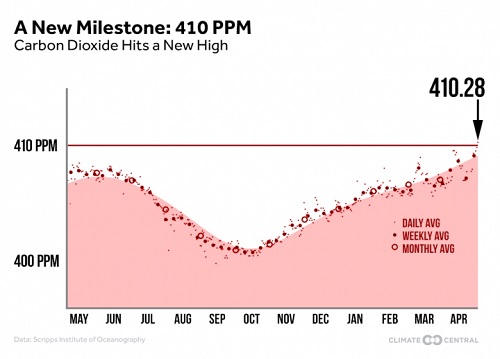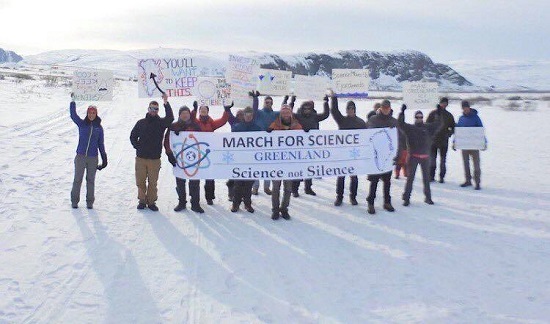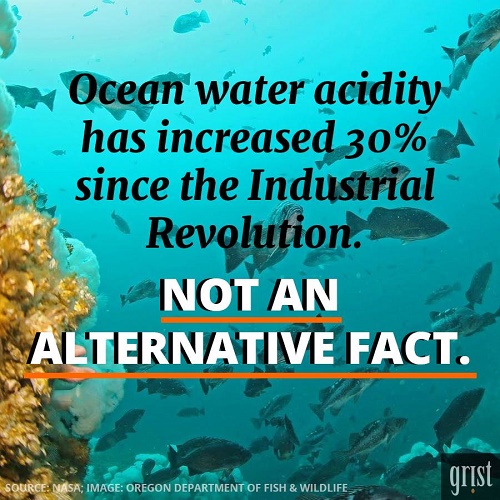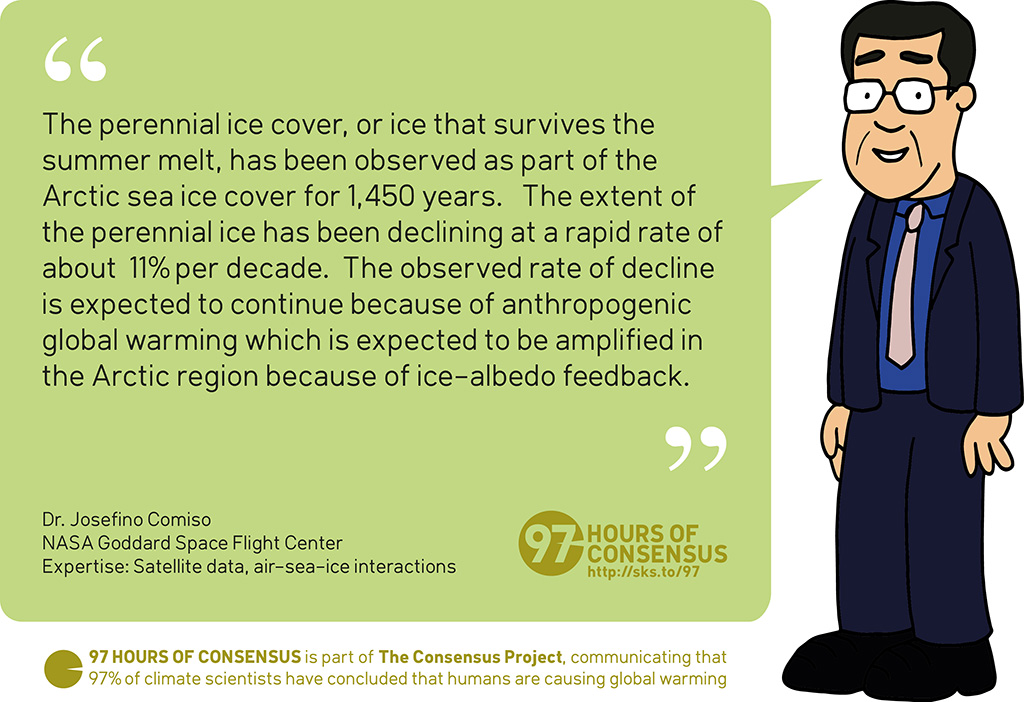2017 SkS Weekly Climate Change & Global Warming Digest #16
Posted on 23 April 2017 by John Hartz
Story of the Week... Event of the Week... El Niño Update... Toon of the Week... Quotes of the Week... Graphic of the Week... SkS in the News... Photo of the Week... SkS Spotlights... Video of the Week... Coming Soon on SkS... Poster of the Week... Climate Feedback Reviews... SkS Week in Review... 97 Hours of Consensus...
Story of the Week...
We Just Breached the 410 Parts Per Million Threshold
The world just passed another round-numbered climate milestone. Scientists predicted it would happen this year and lo and behold, it has.
On Tuesday, the Mauna Loa Observatory recorded its first-ever carbon dioxide reading in excess of 410 parts per million (it was 410.28 ppm in case you want the full deal). Carbon dioxide hasn’t reached that height in millions of years. It’s a new atmosphere that humanity will have to contend with, one that’s trapping more heat and causing the climate to change at a quickening rate.

In what’s become a spring tradition like Passover and Easter, carbon dioxide has set a record high each year since measurements began. It stood at 315 ppm when record keeping began at Mauna Loa in 1958. In 2013, it passed 400 ppm. Just four years later, the 400 ppm mark is no longer a novelty. It’s the norm.
“Its pretty depressing that it’s only a couple of years since the 400 ppm milestone was toppled,” Gavin Foster, a paleoclimate researcher at the University of Southampton told Climate Central last month. “These milestones are just numbers, but they give us an opportunity to pause and take stock and act as useful yard sticks for comparisons to the geological record.”
We Just Breached the 410 Parts Per Million Threshold by Brian Kahn, Climate Central, Apr 20, 2017
Event of the Week...

Crowds massed in the US capital and around the world Saturday to support science and evidence-based research — a protest partly fueled by opposition to President Donald Trump's threats of budget cuts to agencies funding scientists' work.
At the main March for Science, demonstrators gathered at Washington's National Mall to hear speakers laud science as the force moving humanity forward, and rail against policymakers they say are ignoring fact and research in areas including climate change.
"Today we have a great many lawmakers — not just here but around the world — deliberately ignoring and actively suppressing science," one of the event's speakers, TV host and scientist Bill Nye, told a rain-soaked crowd from a stage.
"Their inclination is misguided and in no one's best interest. Our lives are in every way improved by having clean water, reliable electricity and access to electronic global information."
Besides the Washington march, organizers said more than 600 "satellite" marches were taking place globally in a protest timed to coincide with Earth Day.
March for Science: Protesters gather worldwide to support 'evidence' by Laura Smith-Spark & Jason Hanna, CNN, Apr 22, 2017El Niño Update

K. J. Ramesh, Director General of India Metrological department, speaks to the media after a news conference in New Delhi, India April 18, 2017. REUTERS/Adnan Abidi
"The monsoon forecast is reassuring given all southern states in India are seeing a water crisis ... A good, well-distributed monsoon will keep food inflation risk on the lower side and give RBI the elbow room to ignite growth by keeping liquidity accommodative," said Rupa Rrege Nitsure, group chief economist at L&T Finance Holdings.
India could emerge unscathed from the El Nino weather pattern as it is expected to set in only during the latter part of the four-month monsoon season, Ramesh told Reuters last month.
A U.S. government weather forecaster earlier this month said La Nina conditions had disappeared and projected the possibility of El Niño developing later this year.
Forecasters in Japan and Australia also see a 40-50 percent chance of the El Nino weather pattern developing later this year.
India's 2017 monsoon rains seen at average levels: weather office by
Toon of the Week...

Hat tip to 100% Renewable Energy
Quotes of the Week...
“The march is pretty unprecedented in terms of the scale and breadth of the scientific community that’s involved, and it does recall Physicians for Social Responsibility and various scientific groups against nuclear war in the Reagan era, that’s I think the most recent precedent,” said Robert Proctor, a professor of the history of science at Stanford University. “But this is even broader in the sense that there’s a broader perception of a massive attack on sacred notions of truth that are sacred to the scientific community.”
“The current concerns, and let’s say movement, on the parts of many, many scientists and other citizens — and the movements of the current administration — those really do feel pretty unusual,” added David Kaiser, a historian of science at MIT. “And if they’re not completely brand new under the sun, they do feel like a pretty big swing.”
Historians say the March for Science is ‘pretty unprecedented’ by Chris Mooney, Energy & Environment, Washington Post, Apr 22, 2017
Graphic of the Week...

This Graphic Puts Global Warming in Full Perspective by Brian Kahn, Climate Central, Apr 19, 2017
SkS in the News...
[To be added.]
Photo of the Week...

SkS Spotlights...
The Greenhouse Gas Management Institute is a 501(c)(3) non-profit organization dedicated to training tomorrow’s experts on the principles, concepts and techniques to manage and credibly account for GHG emissions.
Mission
“To address climate change by building and supporting a global community of experts with the highest standards of professional practice in measuring, accounting, auditing and managing greenhouse gas emissions; meeting the needs of governments, corporations and organizations large and small.”
Our work involves educating on the basics of GHG accounting, auditing and management, training professionals to meet the highest standards of expertise and ethical conduct, and conducting forward-looking research into critical GHG measurement, reporting, and verification (MRV) issues.
Addressing climate change will require fundamental societal, organizational and behavioral changes on a global scale. The GHG Management Institute’s contribution to this effort is through the construction of the long-term social infrastructure needed to support the implementation of climate change policies, including professionalization of the field of GHG management and accounting. Professionalization occurs when an entire class of people make GHG management and accounting part of their professional identify. We believe this professionalization will be a powerful force to help us combat climate change.
We also believe that it is vital that the population of professionals with the expertise to address GHG emissions is globally widespread. Climate change is a global problem that requires a global solution. We offer financial assistance to other non-profits world-wide, to public agencies, and to small and medium-sized enterprises in developing countries. We welcome grants and contributions to further this mission and to sponsor scholarships. We are also collaborating with other organizations in various regions of the world to provide training in other languages and in ways that address local conditions.
The Institute offers online courses, which can be combined with face-to-face workshops for larger groups with specific needs. E-Learning allows learners a higher quality training experience, access to the world’s top experts as instructors, and the flexibility to undergo training on your own time, without the cost, trouble, and GHG emissions associated with traveling to workshops.
Video of the Week...
Slowly being consumed by the sea and plagued by tropical cyclones, until recently the fate of the Bangladesh island of Kutubdia has been of concern mostly to the many residents driven from its shores. But with millions of people in Bangladesh threatened by the impact of climate change, it may prove a worrying bellwether of what is to come.
Disappearing Islands Fuel Climate Change Fears, VOA News, Apr 19, 2017
Coming Soon on SkS...
- Evidence Squared on the March for Science (John)
- The madness of science denial has scientists taking to the streets (Dana)
- SkS Analogy 2 - Ferrari without gas (Evan)
- Guest Post (John Abraham)
- What does statistical significance actually mean? (Dikran Marsupial)
- 2017 SkS Weekly Climate Change & Global Warming News Roundup #17 (John Hartz)
- 2017 SkS Weekly Climate Change & Global Waming Digest #17 (John Hartz)
Poster of the Week...

Climate Feedback Reviews...
Climate Feedback asked its network of scientists to review the article, How a Melting Arctic Changes Everything by Eric Roston & Blacki Migliozzi, Bloomberg News, Apr 19, 2017
Five scientists analyzed the article and estimated its overall scientific credibility to be ‘very high’.
A majority of reviewers tagged the article as: Accurate, Insightful.
Click here to access the entire review.
SkS Week in Review...
- 2017 SkS Weekly Climate Change & Global Warming News Roundup #16 by John Hartz
- Neil deGrasse Tyson on science vs. denial by Guest
- Heartland Institute's misinformation campaign into schools by John Cook
- SkS Analogy 1 - Speed Kills by Evan
- Yes, we can do 'sound' climate science even though it's projecting the future by Kevin Trenberth & Reto Knutti (The Convesation)
- Humans on the verge of causing Earth’s fastest climate change in 50m years by Dana Nuccitelli (Climate Concensus - the 97% , Guardian)
- 2017 SkS Weekly Climate Change & Global Warming Digest #15 by John Hartz
97 Hours of Consensus...

Quote provided by email.































 Arguments
Arguments






























In the 'reaching 410 ppm CO2 article', it states: " carbon dioxide has set a record high each year since measurements began. It stood at 280 ppm when record keeping began at Mauna Loa in 1958". Is the 280 ppm not a misprint, or am I misunderstanding the context?
At the Scripps site "The History of the Keeling Curve", it states: "in March 1958 and on the first day of operation recorded an atmospheric CO2 concentration of 313 ppm." (Source: https://scripps.ucsd.edu/programs/keelingcurve/2013/04/03/the-history-of-the-keeling-curve/)
[BW] Thanks for the heads-up. We checked with Brian Kahn from Climate Central and he updated this in his article to 315 ppm. So we've followed suit.
@RickG Concur; 280ppm is the pre-industrial level.
I think the Realestate industry is going to be a canary for SLR. Check this article:
The nightmare scenario for Florida’s coastal homeowners
In Bangladesh, they are already facing this stage but no one cares about them as their monetary values are low (unjustly) but S Florida property market crash that we're going to witness very soon (I predict in a decade or two) will be covered in news spectacularly.
CO2 was about 315 ppm when the Mauna Loa observations started in 1958.